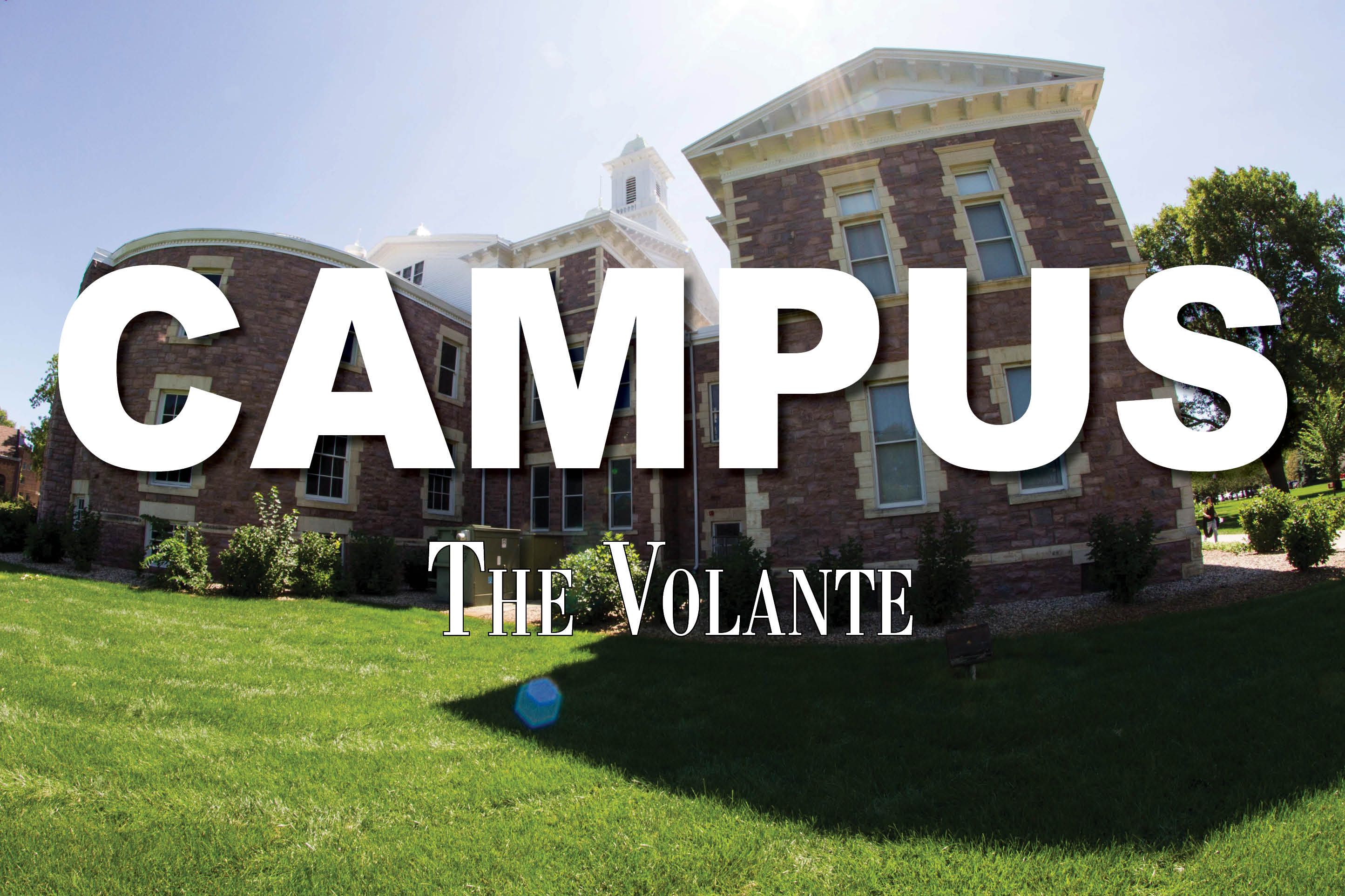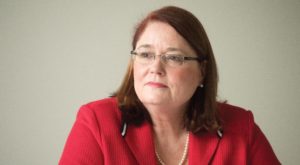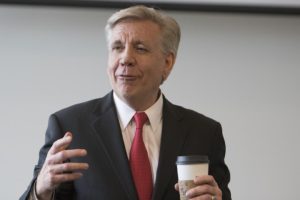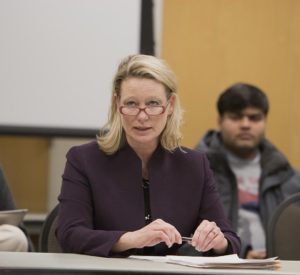
Presidential candidates answer student questions at public forums
by Morgan Matzen, Devin Martin, Lauren Soulek and Kelli Susemihl
Finalists for the university’s next president visited campus Tuesday for multiple forums, meetings and a tour of campus.
Students and faculty alike were able to ask the candidates questions regarding the university’s progress and what they have planned if they were to be appointed by the South Dakota Board of Regents (SDBOR).
Kelli R. McCormack Brown
Kelli R. McCormack Brown currently serves as the provost and senior vice president for academic affairs at Georgia College & State University. Brown said she’s very interested in becoming the next USD president and humbled at the potential of taking on the position.
Brown said the role of USD should be building up critical workforce areas, especially in health sciences, and focusing on USD’s liberal arts foundation.

“I think having a liberal arts experience and a liberal arts foundation is what creates the next leaders of the world. Liberal arts actually prepares you much better for the workforce in my opinion,” Brown said.
Teagan McNary, a former SGA president and a senior political science and criminal justice major, asked Brown about the university’s “Finish in Four” campaign and about Brown’s experience with improving four-year graduation rates at Georgia College & State University.
“The real question is not so much the finish in four, but is really about how do we make sure that we’re meeting the needs of all students that come here,” Brown said. “At my institution, we were able to increase the four year graduation rate as well as our retention rate. We really focused on student success… we hired more academic advisors. Over the last three years, we’ve hired nine career service advisers to be able to help students from the very beginning when they’ve walked on campus from a career perspective to when they actually graduated.”
McNary said she appreciated Brown’s thoughtfulness in her response.
“She had extensive experience in terms of raising the four year graduation plan,” McNary said. “I think her answer of student-centered, student-focused first was answered well. I think she’s really open, and I can always appreciate when someone admits that they maybe don’t have as much experience in one area or another specifically on a question about Native American students and how she may have to be brought up to speed on that, I appreciated her honesty.”
Kevin Huizenga, a junior musical theater major, asked Brown about any history she’s had working in an advocacy role for the arts programs on her campus at Georgia College & State University.
“From an advocacy perspective, recently we renovated a whole building that’s now the new art building, completely renovated,” Brown said.
Huizenga said he hopes the new university president would focus on improving the fine arts program to compete with SDSU’s newer fine arts facilities.
“I hope they are able to help us remain competitive in the fine arts,” Huizenga said. “I felt like (Brown wants) to work on balancing academics and extracurriculars and understanding and working with the funding and such to help balance and really bring programs that are struggling up to the level the university could maintain that.”
Christopher Callahan
Christopher Callahan is currently the vice provost at Arizona State University, the founding dean and a professor at the Walter Cronkite School of Journalism & Mass Communication and CEO of Arizona PBS.
Callahan said in the student public forum that he’s passionate about higher education.
“I’m the first person in my family to earn a college degree. My dad worked two and three jobs at the time to make sure that would happen for my sister and me,” Callahan said. “He also instilled this passion for higher education as this life-altering event where you can take your on a completely different trajectory and I believed that.”

Callahan said students and faculty “are in a very special place” in South Dakota.
“(You’re in) a beautiful part of the country; gorgeous campus, wonderful faculty, fantastic students… There’s (a lot) to like about Vermillion and USD,” Callahan said.
“Taking advantage of the resources already in place,” is important to Callahan. He said he would accomplish that by having conversations with faculty and students about what needs to happen at the university.
Callahan also said he wants USD to have a reputation of being a “progressive university.”
“My hope would be to build on what Jim Abbott has already established and to have a university that is forward-looking, that continues to be students at the center of everything,” Callahan said. “I think there are places where USD can grow… What I would like to think at the end of the day that somebody would say ‘hey we moved the ball forward, that we are more now a progressive university.'”
Callahan also discussed being a Greek Life advocate, reaching out to the SDBOR and South Dakota Legislature and continuing to have conversations about sexual assault and harassment on campus.
Josh Sorbe, political science and economics double major and SGA president, said he’s looking for the next president to be engaging.
“On a personal level, I want somebody who’s engaging and willing to not only continue the legacy President Abbott had, but bring in some new innovations and new ideas to the university,” Sorbe said.
Amber Hulse, first-year political science major and business office manager of SGA, said the incoming president has an opportunity to make changes on a national scale.
“I think that there’s an opportunity here to make some big changes at USD that aren’t necessarily bad big changes that can bring the university on a national scale up higher with some of our counterparts across the nation,” Hulse said.
Sheila Gestring
Sheila Gestring, vice president of finance and chief financial officer of USD, said becoming the new university president would be her dream job. Gestring said she’s lived in South Dakota for all but four years of her life, 15 of the years being in executive positions and 11 of them being at USD.
Shanel Goranowski, a senior psychology major, said she was drawn to Gestring because she was an internal candidate.

“A lot of her resume and cover letter had a lot to do with how she made really large advancements,” Goranowski said. “I think the one thing I didn’t know about her is kind of her social aspect from it. I care a lot about developing classes that maybe are a little bit more behind or need a little bit extra push.”
One of the questions Goranowski asked Gestring during the forum, was what her views on study abroad opportunities were.
“I’ve studied abroad and I felt like that developed me a lot as a person,” Goranowski said. “So I wanted to know about her social views rather than her very impressive financial background.”
Gestring said she’s a supporter of study abroad opportunities and she wants to market that aspect of the university more.
Malachi Petersen, former editor-in-chief of The Volante and a public administration graduate student, said Gestring’s strengths include being an internal candidate and having a background in finance.
“A lot of secondary education and higher education revolves around funding,” Petersen said. “Especially with different funding cuts and budget cuts that the university has faced in previous years from the state Legislature. So, the next university president is really going to need to be able to fundraise money and find new and creative revenue sources for the university.”
During the forum, Petersen asked questions related to sexual assault awareness on campus, the university’s relationship with the Vermillion community and how Gestring will continue to promote the idea of diversity and inclusiveness on campus.
Gestring said she wants to continue the efforts of ICARE in regards to education and prevention towards sexual assault awareness. As for involvement with the community, Gestring said she’s been working towards that more, but it’s a slow process. When it comes to the Center for Diversity & Community, Gestring said she wants to find a “bigger and better” space for the CDC.
Petersen said he’s looking for a university candidate who’s personable with the students.
“President Abbott has spent 21 years here, you can always see him walking through the MUC (Muenster University Center) with McGovern or cheering on the Coyotes at a game,” Petersen said. “I feel that students here have a incredibly close connection with him and they feel they can approach him easily on campus. I want whoever comes in to try to fill those shoes in a similar fashion.”
Phillip Way
Phillip K. Way currently serves as interim vice president at Slippery Rock University in Pennsylvania, where he was responsible for all operations of the university. Way said he’s originally from the United Kingdom and came to the United States 35 years ago.
Prior to that role, Way held teaching and administrative positions at Oxford University, the University of Cincinnati and the University of Alabama at Birmingham.
Way said his prior job experience has helped him realize that forming connections with students is critical. Way said he’s “here to listen.”
“I’ve been out there, I’ve been visible, I’ve been seen a lot by the students,” Way said. “We have had thousands of students over to (our) house for meals and meaningful conversations. People have really gotten to know me well and I think that contributes to a happy campus culture.”
Maddie Butterfield, a junior studying medical biology and a player on the USD soccer team, said the university president has a significant role to play in terms of athletics.
“For an athletic program to be successful, it really requires the president to be on board,” Butterfield said. “When the president is involved and engaged and visible with athletics, it really aids in getting students involved and rallying the campus around it.”
During the forum, Butterfield asked Way where athletics would fit into his overall agenda, and if he enjoys attending university athletic events.
“I love going. My wife and I have been to every home football game. On top of that, we’ve been to at least one game of every other sport,” Way said. “If I were to come here, I would help to do some of the fundraising for athletics… I’m very much into the spectator experience, the people that go to the games and making sure they have a good time too.”
Matt Yetter, a sophomore studying political science, criminal justice and history, said he’s looking for a president who could “be the next Jim Abbott.”
“Sadly to say, I know we can’t find Jim Abbott,” Yetter said. “So looking for the person who can best follow his legacy.”
In the forum, Yetter asked Way how he will continue the legacy of President Abbott, and what he hopes his own legacy will be at USD.
Way said Abbott’s dedication to the university has shown by his long service as president.
“(Abbott) is an amazing guy,” Way said. “I’m not President Abbott. I’m nice, I’m pleasant, but I’m a different person. It’s like a relay… He did a length of the pool, and I’m going to do the next length of the pool, and I might have a different style.”
Way said although he hopes to continue Abbott’s work, he wouldn’t be an exact replacement.
“We shouldn’t be looking to get an exact replacement for President Abbott, because you won’t find one, he’s unique,” Way said. “We need to hope that the person who comes next can live up to his standards, and I’m hopeful that I am the person that can do that.”


